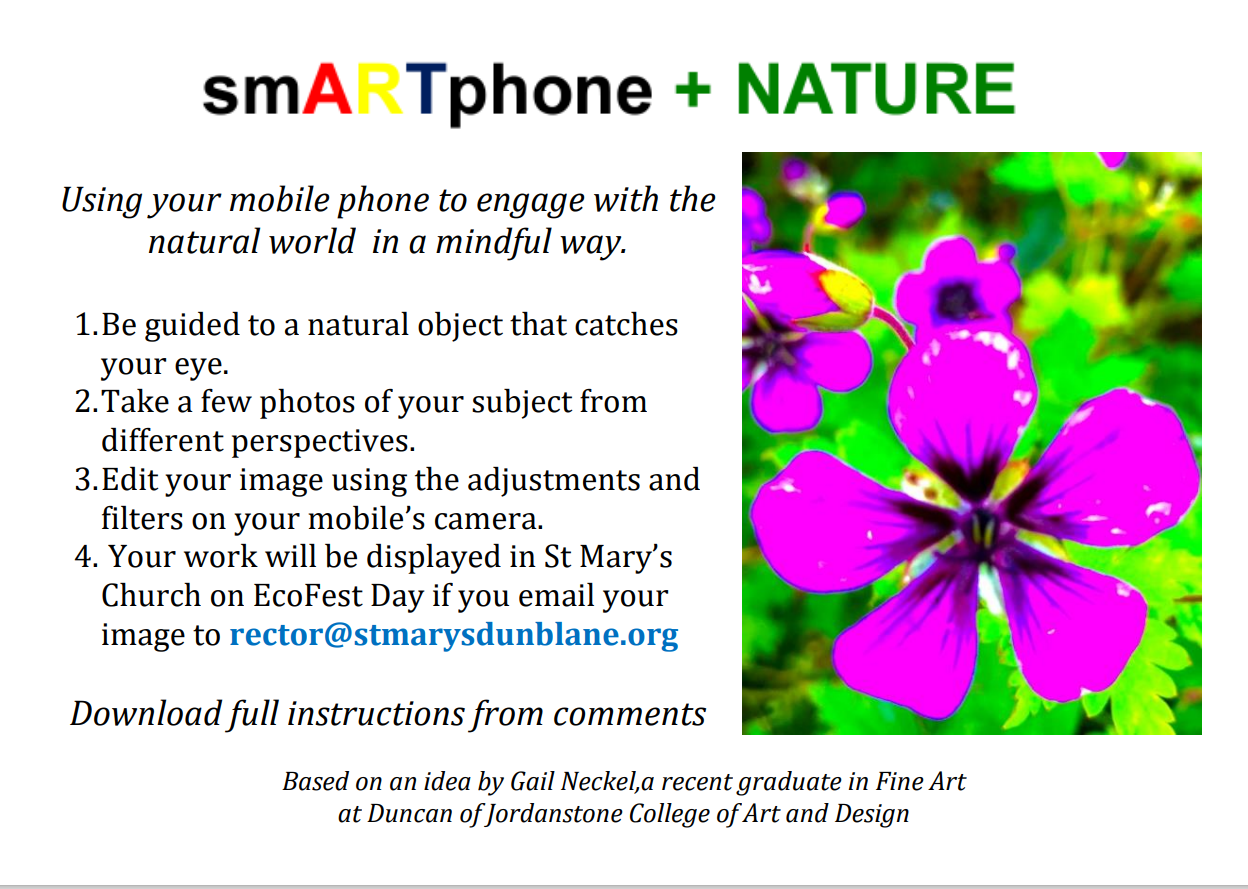Peter writes: It is often said that there is no such thing as a lone Christian. Belonging to the Church (in the widest sense of the word) is essential to being a Christian. Through baptism we become members one of another in Christ, part of a company of saints, embracing both those who are alive today and those who already in heaven. Some of them are people whose lives have touched ours; others are known to us solely through history or the Church’s calendar.
The Feast of All Saints and the Commemoration of the Faithful Departed (also known as All Souls’ Day) both celebrate this mutual belonging. All Saints’ Day celebrates men and women in whose lives the Church as a whole has seen the grace of God powerfully at work. It is an opportunity to give thanks for that grace, and for the wonderful way it shaped their lives. It is a time to be encouraged by the example of the saints but also to be mindful that God’s grace is present in the lives of ordinary people too. Sometimes this may be shown in the way they faithfully followed in Jesus’ footsteps in everyday situations; sometimes it shone forth in extraordinary crises or times of difficulty.
The Commemoration of All Souls celebrates the departed in a more local and intimate way. We remember with thanksgiving before God those whom we have known: those who gave us life, or who nurtured us in faith. This evening we have an opportunity to name them before God and to give thanks for all that they mean to us.
The death of Queen Elizabeth gave rise to widespread expressions of mourning and grief. The accompanying rituals of the funeral may have allowed people to express a personal grief that had lain hidden within them, perhaps for many years. These rituals are important to our well-being and they are far removed from the ghoulishness of Hallowe’en. It is no accident that All Saints and All Souls fall together in the Church’s year. We celebrate and give thanks for the lives of the saints in light and glory and we also hand into God’s safe keeping those parted from us but whose lives are still dear to us.
In these two days we are celebrating life not death, light not darkness, hope not despair, and love, especially God’s love, from which nothing, not even death can separate us, as St Paul writes in Romans chapter 8.
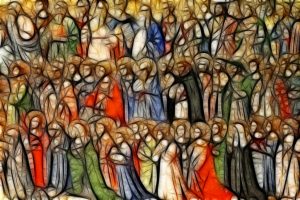
Prayers: in thanksgiving for the holy ones of God and in faith for his everlasting love and mercy.
For Abraham and Sarah, our ancestors in faith,
and all who journey into the unknown trusting God’s promises:
For Jacob, deceitful younger brother, yet chosen by God,
the father of all who are called not by virtue but by grace:
For Moses the lawgiver and Aaron the priest,
and all who lead God’s people to freedom and newness of life:
For Isaiah, John the Baptist and all the prophets,
and all who speak the truth without counting the cost:
For Mary the Virgin, the mother of our Lord and God,
and all who obey God’s call without question:
For Andrew and John and the first disciples,
and for all who forsake everything to follow Jesus:
For Stephen, Alban, Agnes, Lucy and the whole army of martyrs,
and all who have faced death for love of Christ:
For Columba and Aidan, for Ninian and Patrick,
and for all who have carried the gospel to this and other lands:
For David, Cuthbert and Francis,
and for all who live and teach the love of God:
For the martyrs and peacemakers of our own time,
who shine as lights in the darkness:
For all the unsung heroes and heroines of our faith,
whose names are known to God alone:
For all those in our own lives
who have revealed to us the love of God
and shown to us the way of holiness:
Thanks be to God.
In the silence of your hearts, name those whom you have loved but see no longer.
Jesus said, “This is the will of him that sent me,
that I should lose nothing of all that he has given me,
and I will raise them up at the last day.”
Lord God, creator of all,
you have made us creatures of this earth,
but have also promised us a share in life eternal.
According to your promises,
may all who have died in the peace of Christ
come with your saints to the joys of your kingdom,
where there will be neither sorrow nor pain,
but life everlasting.
Amen.
Nerys writes: Among my favourite Bible tales when I was a child were those of Zacchaeus and Blind Bartimaeus, two comical and dramatic stories which captured my imagination. But I didn’t realise until this week that these two characters are connected. They form one of the many contrasting pairs in Luke, like the Pharisee and the Tax Collector of last week’s Gospel passage. The chapter divisions of the New Testament have broken the two episodes apart but when we read Luke 18.35-43 and 19.1-11 together, we see that there’s a symmetry to Jesus’ visit to the town of Jericho. As he arrives, he heals the blind beggar and as he leaves, he extends love to the chief tax collector.
In his wonderful book, Jesus through Middle Eastern Eyes, Kenneth Bailey draws out the connection and the contrast between the two characters. Both are marginalised and rejected by their community but one is a man oppressed whilst the second is an oppressor.
Throughout Luke’s Gospel, we see Jesus siding with people like the blind beggar. The poor, the widow, the outcast, the refugee, all receive his special attention and compassion. But what about people like Zacchaeus? What about the religious leaders, the soldiers and tax collectors, those who have grown rich and powerful by exploiting others?
It is natural to assume that Luke’s message is that we should simply oppose people like these. After all, in Mary’s Song, the Magnificat, right at the beginning of the Gospel, we are told that God ‘has put down the mighty from their thrones and lifted up the lowly, that he has filled the hungry with good things and sent the rich away empty’. Likewise in the Sermon on the Plain, Luke’s Jesus accompanies his blessings of the poor and the hungry with ‘woe to you’ statements, warning those who are living comfortably now that their fortunes will be reversed. And elsewhere, Jesus teaches that is impossible for the rich to enter the kingdom of God just as it would be for a camel to pass through the eye of a needle.
But is it possible to oppose an oppressor and at the same time show compassion towards them? Is there space in the Kingdom of God for a man like Zacchaeus?
Just as with the character of the Pharisee in last week’s parable, there is, I think, deliberate ambiguity and also a certain irony in the way Zacchaeus is presented by Luke. Most of us are so used to reading the story in a certain way that we only see the individual and his conversion. But Zacchaeus was part of a community whose response to him and to the blind beggar shows that they are as far from God’s kingdom as they thought he was.
The good people of Jericho would have despised Zacchaeus. His name is a diminutive form of Zechariah, derived from a Hebrew word meaning ‘pure’, but in their eyes there was nothing pure about the way of life he had chosen. Zacchaeus was rich in the worst possible way. He had become wealthy by exploiting his own people and collaborating with their enemies. You couldn’t blame his victims for shutting him out of their lives or even for taking the opportunity on that fateful day to get their own back on him by blocking his access to Jesus.
Zacchaeus may well have been physically small but he would also have been regarded by his community as being small-minded – petty, greedy, with a low expectation of himself. Here was someone who hadn’t ‘grown before God and people’, someone who had sold himself short, who certainly wasn’t living up to his name. And yet, paradoxically, Zacchaeus had retained a childlike ability to keep seeking the truth. He really wanted to see who Jesus was. And like a child, he scampers up a tree to get a better look. In his eagerness to respond to God’s call, he forgets decorum and even neglects his own safety, putting himself in an extremely vulnerable position.
Having found him in that tree, the crowd look to Jesus to express their anger and hatred towards their oppressor. Instead, Jesus does the unthinkable. He invites himself for a meal in Zacchaeus’ house. In doing this, he neither endorses the oppression nor ostracises the oppressor. Instead, he expresses God’s love and acceptance of the individual and by accepting this love and responding to it, Zacchaeus discovers repentance and restoration.
The love expressed by Jesus to Zacchaeus is a costly love. It shifts the crowd’s hostility against Zacchaeus to himself. The community is able to accept the criticism that is inherent in Jesus’ healing of the blind man, someone they themselves had oppressed and rejected, They respond by joining him in his praises to God. But seeing Jesus offering the same special grace to their oppressor is a different matter. The mood of the crowd changes again; praise turns to the muttered condemnation which had already become so familiar to Jesus and which would dog his footsteps as he continued on his final journey to Jerusalem.
In today’s increasingly divided society. it’s often easier and safer to vilify the other rather than to try to understand and offer love. Before you pray for both the oppressor and the oppressed in our world, our community and our church, I invite you to explore the painting below made in 1913 by Danish artist Niels Larsen Stevns, I wonder where you would place yourself in the picture and why?
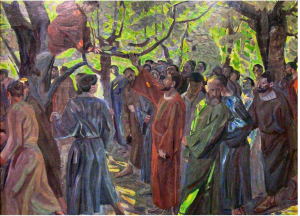
Rachael writes: I saw the image below online in the week. Yellow and black like a hazard warning sign for nuclear waste, at the top a big fish with its mouth open is chasing after little fish. Underneath them it says “Do not panic”. Below that, the picture is of the big fish now facing the other direction and all the little fish have arranged themselves to look like an even bigger fish that almost has its mouth around the original big fish. Underneath that it reads “organise”. “Do not panic – organise”.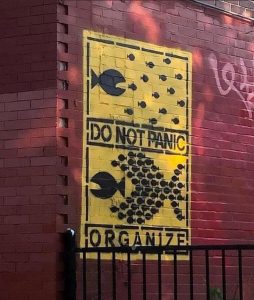
Our story from Jesus this morning (in Luke 18.9-14), of a Pharisee and a tax collector, is just the next part of the same speech that last week’s story of the unjust judge and the persistent woman came from. Jesus offers both in answer to a question from the real-life Pharisees about when the Kingdom of God would be coming.
Initially Jesus responds to them by saying “the Kingdom of God is among you”. Then he offers the story of justice and faith: of a woman who perseveres and of God who respects and deeply cares for people. And he follows that up with another dichotomy between two opposing characters. This is what the Kingdom of God is like, Jesus says: a Pharisee and a tax collector.
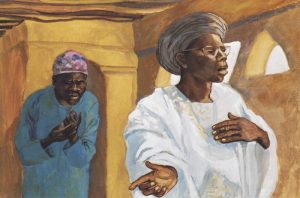
If you had to describe the Pharisee in one word, you might choose “arrogant”. And if asked to do the same for the tax collector, “humble” may well be the word that comes to mind. It comes from the most common Christian interpretation of this passage which many of us will have heard before. However, if we go down the road of Pharisee equals judgemental and bad, and tax collector equals humble and good, as we denounce one character and celebrate the other we find ourselves engaging in the very behaviour that we’re saying the parable condemns. Is there an alternative?
Well first, let’s re-cast the actors based on what we know of historical Jewish culture and religious practice. The Pharisee, amongst first century Jews, would have symbolised a beloved teacher, a pillar of the community, someone deeply admired. The tax-collector, on the other hand, represents a wealthy bootlicker of the 1% and co-conspirator with the occupying enemy.
While the Pharisee is often read as being someone who is taking pride in his own efforts, his first words point to a humble awareness of his need of God. “God, I thank you” he says. We seem to assume that they are empty words but what if this is genuine gratitude and praise for the way his life has turned out and for God’s provision for his ministry? The Pharisee goes above and beyond the law which requires him to fast only on certain feasts (not twice a week as Jesus says he does) and to tithe from the proceeds of his agricultural income (rather than from everything he earns). Both his fasting and his tithing would have been about helping his community which was subject to a brutal occupation. He was contributing to their financial assistance and pleading (like our woman before the judge) for God’s mercy on the Jewish people. His proclamation can be read as self-aggrandisement with a side of contempt for others, or it can be considered heartfelt gratitude and a declaration of reliance on God. Something more like “for there but by the grace of God go I”.
And what about our tax collector? Christ’s Jewish hearers may have eagerly anticipated a wonderful story of redemption where the tax collector engaged in the teshuva or “atonement” rituals and turned his life around, after all, a story of someone who has wronged you being sorry and doing their penance can be deeply cathartic. To have completed these familiar rituals properly the tax collector would have had to admit the harm that he had done, apologise, done all that he could to repair that harm, felt and expressed sincere regret, vowed not to do the same again, and offered a sacrifice in the Temple as a public and religious acknowledgement of his wrong doing. Even then the process of atonement would only be complete when he had opportunity to do the wrong again but chose not to. We don’t get any of that. Just a meagre request for mercy before he trots off home with no word of whether he is going to leave behind his lucrative profession. The listeners may well have been troubled that Christ declared him justified after so little evidence of repentance.
So where does a new understanding of the characters leave us in understanding what Jesus was trying to say with the parable? Well, it all turns on one four letter Greek word: “para”. In our bibles it is translated as “rather than”. But it also means “with”, “alongside”, and “because of”. The tax collector was justified with the Pharisee. The tax collector was justified because of the Pharisee.

Remember this is a parable about the Kingdom of God. Despite all the things that might divide or separate them, or what his listeners might think of them, I believe that Jesus is saying they are both part of it. All through the gospels we see Christ invite disparate people: pharisee and tax collector, fisherman and zealot, prostitute and centurion, to be part of the Kingdom community. He reminds us that we are interconnected and interdependent because God made us so. Christ calls us to remember that. To re-member it. To, by God’s help, put it back together.
It means that when we’re faced with the scary and anxiety inducing things happening in our world, our country, and our community: we do not panic, we organise. And together, as a Kingdom community, we seek a Kingdom kind of justice. “When is the Kingdom of God coming?” the Pharisees asked. “The Kingdom of God is among you”, Jesus replied. In justice and community. Amen, may it be so.
O God, in your mercy: grant your people humility and gratitude, that, inspired by your love and strengthened by your Spirit, they may live and work to spread your justice and deepen community, as a sign of your Kingdom; through Jesus Christ, our Lord, who lives and reigns with you, in the unity of the Holy Spirit, one God, world without end. Amen.
Nerys writes:
As you prayerfully read today’s Gospel passage, Luke 18.1-8, I wonder if you will be struck by a particular word or phrase.
I had always thought of Jesus’s comic story of the shameless judge and the determined widow as being about our private prayer. I understood it as encouragement for those who were discouraged, disappointed or despairing, like Luke’s first readers living in a time of persecution, to pray always and not to lose heart. As I read the parable this week, however, the word ‘justice’ jumped out at me and I realised that it appears in the passage more often than any other word.
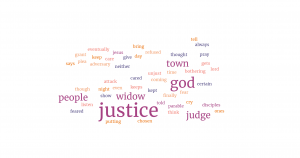
We don’t know why this vulnerable woman needed to come before the judge. All we are told is that she was seeking justice. She asks him to ‘grant me justice against my opponent’, or literally ‘against the one who has treated me unjustly’. The judge, however, has no sense of right or wrong. He is someone who doesn’t fear God or care what people think of him. Despite her plea, the unjust judge does nothing. The poor widow is powerless before him but her faith in justice drives her to persevere. She ignores her own low status, she ignores all social conventions and proprieties. At the gate of the city, an area dominated by men, she keeps on coming, speaking out, making a nuisance of herself with her loud persistent pleading for justice until finally, realising that she is not going to give up, the judge relents and does the right thing. In the original Greek, he says, ‘because this widow causes trouble for me, I will give her justice, so that she may not, in the end, give me a black eye by her coming’. The image from the world of boxing is comic, but it also conveys the force of this feisty woman’s determination to obtain justice.
It is clear that the American artist, James B. Janknegt, is very aware of the ironic humour in Jesus’ teaching. After you have read Luke 18.1-8 again, you may wish to spend some time exploring his modern interpretation of the parable.
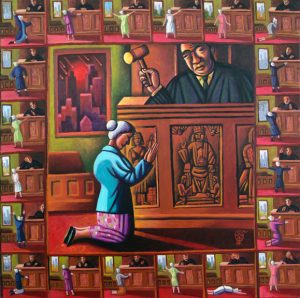
Jesus holds the widow’s fighting spirit up for admiration whilst contrasting the corrupt and selfish judge with God who is just and compassionate. If such a rotten judge can be persuaded to do the right thing just by being pestered, he infers, how much more will God act with speed to help his children when they call out to him? We offer our prayers within a relationship of love and confidence to God who cares passionately about us and about justice, so we should never be discouraged or tempted to give up.
Luke has Jesus speak these words on his way to Jerusalem where the faith of his disciples in justice was to be greatly tested. In his teaching, he is preparing them for the difficult times ahead. The passage finishes with a question which contains a warning: ‘When the Son of Man comes, will he find faith on earth?’ The disciples would have known exactly what Jesus meant, for he had just been talking with them about his eventual return, when every injustice would be righted and the whole world restored to what God intended. His two unforgettable characters represent two different attitudes to the coming of God’s kingdom. Which of these two attitudes, Jesus asks, will he find among his followers when he returns? Will they have given in to the desire for a quiet and comfortable life, or will they have remained committed to fight for justice whatever the cost?
This is a challenge for us today where we find power-hungry people and unjust and corrupt systems causing poverty, suffering and death. We often feel powerless to make a difference but Jesus’s story encourages us to keep on praying. It reminds us that prayer is not a passive activity if, in our prayers, we actively seek and pursue God’s will for justice in our lives and in the world.
I invite you to spend your time of prayer this morning calling on God to help you to seek justice for those who are exploited and oppressed:
- for the people of Ukraine whose lives are being destroyed by an unjust war
- for the people of African countries who are facing starvation because of human greed
- for people forced to seek asylum who are being treated with hostility instead of hospitality
- for the victims of modern slavery
- for those imprisoned unjustly or facing unjust punishment for their crimes
- for people in this country descending into poverty because of political decisions which favour the rich
- for people being discriminated against because of their race or colour, age, gender or sexuality
- for families where there is violence, conflict or broken relationships
Rachael writes: We’ve been doing harvest themed assemblies and services in the schools all this week. We’ve been asking the children to think about their food, where it comes from, and who it connects them to.
 Think about the food in your own house. Can you see your cupboards, your fridge, or your freezer from where you’re sitting? Open them in your mind’s eye to see the food within. Can you see your secret stash of chocolate biscuits on the top shelf that no-one else can reach?! Think about the food in your own house. Can you see your cupboards, your fridge, or your freezer from where you’re sitting? Open them in your mind’s eye to see the food within. Can you see your secret stash of chocolate biscuits on the top shelf that no-one else can reach?!
As you’re reading, can you see the spot where you normally eat your food, or rather what you set your plate or bowl on to eat? Is it a table? Or a breakfast bar? A comfy chair and lap tray?
I wonder if you can think of a meal that you’ve recently enjoyed eating around a table? Think back to who you were with, what you ate, and how you felt at that meal?
In our first reading this morning (Deuteronomy 26.1-11), the people of Israel are instructed to celebrate the harvest by eating a meal together in the temple, in their place of worship. And in the Gospel (Mark 2.13-17), Jesus is eating with all different kinds of people who the strict religious types didn’t approve of. Jesus said that at that table, with those people, was where he belonged.

Times of eating together are really important. They build community and relationships. In eating a meal together, we learn to speak and to listen. To share and to serve. At a table like that, everyone is equal, everyone is unified.
On our tables, everything is interconnected. Creation and people many thousands of miles away in circumstances wildly different to our own are represented in plates, cups, foods, and ingredients, that have come from the earth and been produced by human hands other than our own. In our meals we are reminded of our reliance on nature, our fellow human beings, and on God.
In the church we gather around the table of the altar to share the meal of the Eucharist. That simple sharing of bread and wine communicates to each of us the incredible love of God, known in the life, death, and resurrection, of Jesus. It also shows us something of what the Reign of God on earth as in heaven might look like – that a disparate people is gathered together and no matter their circumstances shares the same bread and wine as equals and siblings.
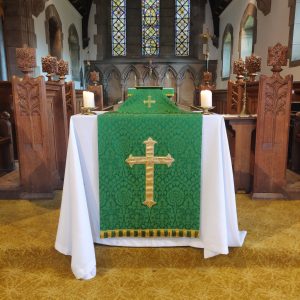 Every table and every meal can be a reminder of that meal. Because from the altar we are sent back to the tables in our homes and invited to share there the same loving fellowship with neighbours and friends, with those who are lonely, lost, or lacking. We’re sent to bring a little of heaven to earth, to share abroad God’s love, with whatever energy, time, and means, that we have. Every table and every meal can be a reminder of that meal. Because from the altar we are sent back to the tables in our homes and invited to share there the same loving fellowship with neighbours and friends, with those who are lonely, lost, or lacking. We’re sent to bring a little of heaven to earth, to share abroad God’s love, with whatever energy, time, and means, that we have.
Maybe it’s been a long time since you came to the altar. I would invite you to come if you are able, to receive and be fed, in order to be strengthened for this task we are given. And if you can’t come to the altar, the great news is that it can come to you! Myself, Nerys, and the Pastoral Team, would be delighted to bring the Reserved Sacrament to your home to share, just let us know if you’d like us to.
As we pray, and in response to our harvest celebration, I invite you to think about someone you could share your hospitality with, share your blessings and harvest with. Maybe a friend or neighbour. Someone at school or work or a club that you go to. It might an individual or a group. Hold them in your mind. And then tell God the kinds of things you’d like to share with them. It could be food but also your talents or something else that might meet their need or help you to come together. Ask God for help in doing this.
Let us pray:
God, in whom all things are possible, You crown the year with your goodness and give us the fruits of the earth in their season: grant that we may use them to your glory, so that none may hunger, none may thirst, and all may cherish the gifts of your creation, through Jesus Christ our Lord, who lives and reigns with you and the Holy Spirit, one God, now and for ever. Amen.
Peter writes: Last week my middle son turned 50 – a sobering thought, and I wonder what the world will be like by the time his children turn 50. His birthday falls on the feastday of St Nicholaus von Flüe. Commonly known as Bruder Klaus, he lived in the mid 1400s and is the patron saint of Switzerland. He grew up in an alpine village roughly halfway between Lucern and Interlaken. In his younger days, he was a man on the way up, holding various senior positions in political life. He was known for his integrity as well as for his deep faith and could have gone on to become a great national leader.
Looking at today’s readings, Habakkuk 1.1-4, 2.1-4; 2 Timothy 1.1-14; Luke 17.5-10, I was struck by how appropriate they are for the theme of vocation. We have that very much in mind, as Rachel takes the next step in her vocation and ministry this afternoon. Vocation does have its joys, as I can readily testify, but also its hardships, as the letter to Timothy reveals. And, equally, we can see from our readings that all Christians have a vocation and that often means giving up or doing without some of the things that others would consider desirable or essential.
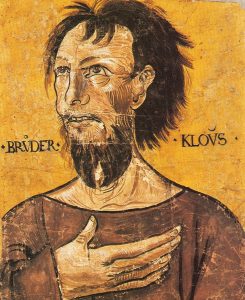
Bruder Klaus’ early political career offered prospects of high status and a life of ease, but he gave it all up to follow a different vocation. He returned to his village, living the simpler – some would say limited – life as a hermit. It wasn’t long before people started to come to him in droves to ask for his prayers and for advice on political and legal matters. Once his mediation even prevented a war between the cantons. I suppose this was what we now call soft power. His hermitage and chapel still stand, in a wonderful spot down a steep valley slope from the village and to celebrate the Eucharist there was a deeply moving experience for me.
Thinking about his life led me to wonder about our vocation as Christians in this Season of Creation. When you visit Bruder Klaus’ village today, you will see how the alpine glaciers are disappearing. These glaciers form an enormous natural reservoir, supplying all the major rivers of Europe. Their disappearance will have a devastating effect on agriculture and living conditions. Floods and droughts in other parts of the world are already leading to famines, mass migrations and wars.

The Eiger Glacier (public domain)
We cannot carry on with business as usual. Already poor communities can only afford to live on flood plains and other marginal land where they are vulnerable to natural disasters. Prophets like Habakuk were fierce in condemning injustices like this. Perhaps we need to admit that some so-called natural disasters are not natural at all.
When we see the ambitious targets that are being set, the basic question is: are we willing to change our habits in order to meet them? To put it in theological terms: are we willing to repent? Last Sunday, in the letter to Timothy we read “There is a great gain in godliness combined with contentment”. There is a difference between, on the one hand contentment that comes from gratitude – “Then thank the Lord, o thank the Lord for all his love”; and on the other a contentment based on the self-satisfaction of those who have made it in the eyes of the world. The gains of godly contentment lie in the achievement of justice, of love and respect for all people and for all God’s creation.
We are beginning to make changes – taking recycling for granted or reducing single-use plastics. But do we really need to have strawberries flown in for Christmas? Are we tackling the current rise in energy prices the right way? Obviously we must help those who are plunged into poverty now but I cannot help thinking that today’s crisis should force us to act more urgently to achieve radical reduction in carbon emissions. Perhaps should some of the money already earmarked be put towards properly insulating our homes?
There are other changes we could – should – make. Animal husbandry is a very inefficient way to cater for our high-protein diets. It uses up huge amounts of land and water for grazing. Do we need to have meat on our table every day? And then, there’s transport. We all know about flying. But, if I gave up flying completely would would I never see my son in Canada again? There are hard choices to be made. Most of us still rely on our cars, but iff there was reliable and cheap public transport we could leave them at home more often.
Our vocation in this climate crisis has to be one of repentance. The word means “turning back”. Our vocation calls us to realise we have been going in the wrong direction and to act and speak accordingly. The actual issues might have been different in biblical times but the underlying causes are remarkably similar. Our response to the climate crisis is not simply a secular matter. It is there in the Bible.
For prayer and reflection
A prayer of Nicholaus von Flüe
My Lord and my God, take from me everything that distances me from you.
My Lord and my God, give me everything that brings me closer to you.
My Lord and my God, detach me from myself to give my all to you. Amen.
Loving Father, who through your Son has given us His Church as a community of faith, hope and love, keep us faithful to our vocation to do what pleases you in building your Kingdom here on earth. We pray especially for Rachel as she takes the next step in her calling today.
Creator of earth, sea, and sky, kindle the fire of your Spirit within us that we may be bold to heal and defend the earth, and pour your blessing upon all who work for the good of the planet.
Breath of life, receive our thanks for the beauty of your creation; grant us the wisdom and will to conserve it and to heal its wounds. We thank you for its wondrous diversity and we pray for its well-being.
Wise Creator, receive our gratitude for places of restoration and healing, and continue to bless those places that feed our lives and spirits. Giver of all good gifts, awaken us daily to our dependence upon your bounty, and make us always thankful for the abundance of your blessings.
(From materials for Creationtide of the Scottish Episcopal Church)
Nerys writes: I wonder how many billionaires you are able to name? If you read the papers or watch television, or if you’re on social media, I would imagine that it might be quite a list. Our society is obsessed by the lives of the super rich, their relationships, their latest acquisitions, what they wear, the glitz and glamour, the never-ending scandals …
Now, what if I asked you for the names of any of the people killed in the flooding in Pakistan at the beginning of this month? Or what about the names of any of those threatened by starvation as crops fail year after year in parts of southern Africa, or those who lost their homes in Madagascar two years in succession from hurricanes super charged by warming oceans?
In our Gospel today, Luke 16. 19-31, it is the poor man, not the rich man, who is given a name by Jesus. I wonder why that is.
Earlier in the chapter, Jesus’s teaching about wealth had been ridiculed by some Pharisees. These money-loving religious leaders believed that being rich was a sign of God’s favour and that being poor was the result of sinfulness. They mock him for saying that you can’t serve God and wealth at the same time so he responds by telling his version of a popular folktale about a rich man and a poor man who are neighbours but who belong to two very different worlds.
We are introduced first to the rich man, clothed in purple and fine linen, hugely expensive robes costing many times the value of a working man’s annual wage. He feasted in luxury every day on exotic and costly dishes, in a country where ordinary people were lucky if they ate meat once a week. We also gather that he lived in a gated house guarded by dogs. It was at that gate that Lazarus lay every day, helpless and hungry, dreaming about the scraps from the rich man’s table, covered in sores with only the dogs to comfort him.
And then they both die and their roles are reversed. Now Lazarus is the one in glory, looking down from heaven, and the rich man is the one in torment, looking up, begging. At this point it becomes clear that this is more than a moral tale about riches and poverty. Jesus isn’t condemning the man simply for being rich, but for being selfish in his use of his wealth. At this point in the story, it becomes clear that this man knew Lazarus by name. He couldn’t use ignorance of the plight of his neighbour as a defence for not coming to his aid. He had been aware of Lazarus’ suffering but had chosen to do nothing to alleviate it.
At this point in the story also, it becomes clear that the rich man knew how he should have responded. He claims Abraham as his father. He must then have been familiar with the Scriptures. He would have known the Law of Moses which teaches compassion for the needy, and the Prophets who ceaselessly spoke out against the exploitation of the poor. The rich man knew the right thing to do but he chose not to do it. It’s no wonder that in death there was a great chasm between him and heaven. In life, he had cut himself off from others by his love of wealth and luxury, and by doing so he had cut himself off from God too.
A grim warning to the Pharisees who were behaving in a similar way towards the sick and poor in their communities. They were very quick to accuse Jesus of breaking God’s law but their love of money was leading them to disobey those parts of it which speaks of helping the poor, sharing our possessions with those in need and graciously providing a welcome to all. By giving Lazarus a name, Jesus was reminding them that every poor person is a unique individual who should matter to us. By not giving the rich man a name, Jesus was warning them that the man could be any of them who was doing as he did.
Although we don’t know the names of our neighbours who are worst affected by climate crisis, we are aware of happening to them and why. Images of their suffering appear daily on our screens and in our newspapers. We are also aware of what God is calling us to do in response. Our Old Testament reading for today, Amos 6.1a, 4-7, contains savage words from the prophet against the idle rich who profit from a system skewed in their favour, and in the Epistle, 1 Timothy 6.6-19, there are words of warning and encouragement.
We may not be rich in our own eyes but, compared with these people, we’re well off. They would be glad to change places with us, and we would be horrified to share their lives, even for a day. Like Luke’s Jesus, the writer of the letter to Timothy doesn’t urge us to give up all our money and possessions but to approach them as a gift entrusted to us by God who cares for all his children and expects us to do so too.
The rich man could easily have lifted Lazarus from destitution, restoring his dignity and health but he chose not to do so. We and our governments have a choice to heed the cries of the poor or to ignore them. As an introduction to your time of prayer this morning, I invite you to read the stories of two of our neighbours whose lives have been devastated by the effects of climate change and as you reflect on them, to allow God to disturb and discomfort you.
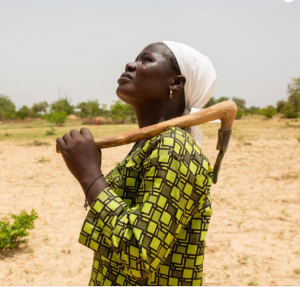
Patouma is a farmer in southern Malawi. Until recently, she has relied on growing maize on a one-acre plot of land to feed her family but climate change is now making this very difficult. ‘In a good year, when the rains are good, I can sometimes harvest up to 15 bags of maize. Last year, I planted my crops as usual but due to the drastic change of climate and very little rain, I only managed to harvest one bag. That only lasted one month. My family and I had never before been as hungry as we were then’.
Nonhlanhla who lived in the north of Durban in South Africa, was a bright girl, who was studying at the university. As she couldn’t afford the residence fees, she stayed in a shack which she and her brother built on the banks of a river. In Africa extreme weather events are becoming more frequent and more extreme as a result of climate change. Just before Easter 2019, Durban was hit by the heaviest rains recorded in 60 years. A year’s worth of rain fell in two days resulting in catastrophic flooding. Nonhlanhla’s home was washed away. She drowned in a wall of mud.
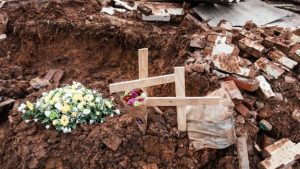
For more stories of individuals in different parts of the world affected by extreme weather due to Climate Change click on http://www.wateraid.org/uk/stories/climate-stories which will take you to the website of Water Aid, the charity we are supporting in our Harvest Appeal this year.
Peter writes: In this Season of Creation we focus on celebrating God’s goodness but also the threats to the environment. We have heard about ways we can react. But today I want us to take a step back, and consider how all this is underpinned by our Christian faith and teaching.
Anglicans-Episcopalians express their belief through their prayers and liturgy. So, to see what lies behind our Christian response to the climate crisis, let’s look at our liturgy. We can start with the Creed. Its opening words are repeated in our Eucharistic Prayer for the Creation season, which we offer in praise and thankfulness to God, “Creator of all things, visible and invisible”. We go on to say that, in Jesus Christ, God became incarnate, took on human form. And so, for God, matter matters. Unlike some earlier heresies – and indeed what some still maintain – orthodox Christians believe that all things visible are important to God and he has not created them for nothing.
Still less did he create it for us to do with as we wish regardless of the consequences. Interestingly, Stephen Cottrell, the Archbishop of York, recently suggested that we should go back to the earlier phrase in the Lord’s Prayer and say “your will be done in earth as in heaven”, because in expresses, quite literally, a superficial concept of creation, whereas God is involved in all that goes on; his kingdom is made manifest in his creation. In fact, the opening section of our Eucharistic Prayer picks this up when it says “the earth, the sea and all that is in them [praise him] in every place and at all times:”
The prayer goes on to say that God formed us in his own image and “entrusted us with the priesthood of his creation”. Our concern for the environment revises an earlier understanding of the creation narrative in Genesis. God did not create the plants and the animals solely for our benefit. They have value in God’s sight and our rôle is to be stewards, with responsibilities for their well-being. Jesus said “I come among you as one who serves”. Being formed in God’s image means that we are also to be servants, not dictators, of the environment.
When we are considering the theology of creation, we should also recall that our fundamental act of worship requires bread and wine, “which earth has given and human hands have made.” That is, the fruit of the earth becomes the outward and visible matter of God’s undying love. It is longer food for our bodies alone but also becomes food for our souls.
Our Celtic ancestors were keenly aware that God is manifest in the rhythm and beauty of nature. For some today this has morphed into a pagan new-age spirituality – “God is in every stone and blade of grass”. Celtic Christianity was (and is) much more trinitarian and orthodox, however. It professes that the whole of creation contains tell-tale signs of something infinitely greater beyond it and giving it purpose.
Today’s climate crisis has forced us to re-learn this lesson and to act accordingly. By abusing God’s creation we risk obliterating these outward and visible signs. Not only will the material resources of the world be exhausted, we ourselves will be spiritually impoverished.
In this Creation Season – as always – let us pay special heed to what we say in our liturgy so that, through God’s life-giving Spirit, we may be called to new birth as children of his redeeming purpose in a world restored by love.
For Reflection and Prayer

William Blake, The Ancient of Days setting a compass to the earth (Public domain)
This world
is not the accomplishment
of a moment of your time, Lord,
that we can see clearly.
Those rugged cliffs,
thrust from the depths of the sea,
filled with the evidence of the past,
were not created in the blinking of an eye.
The diamond’s hardness,
did not come suddenly.
This is the work of an infinite patience,
the creation of something
of which its creator could be pleased.
And now Lord, this infinite patience,
this creative love is directed towards us,
formed as we are from the very elements
of the world in which we live.
Your creative Spirit still at work,
tireless, ceaseless,
endlessly creating in our hearts the
image of your likeness.
The only difference being,
the diamond had no choice
in whether it would be transformed
into such beauty.
A Celtic prayer from “Faith and Worship” compiled by John Birch
Bishop Ian’s prayer on the death of Queen Elizabeth
Gracious God,
we give thanks for the life of your servant
Queen Elizabeth,
for her faith and her dedication to duty.
Bless our nation as we mourn her death
and may her example continue to inspire us;
through Jesus Christ our Lord. Amen.
Nerys writes: Today’s Gospel, Luke 15.1-10, which contains the parables of the lost sheep and the lost coin, is so familiar to us that it would be easy to think that there is nothing new it can teach us. It would also be easy to dismiss it as irrelevant to the themes and issues of the Season of Creation. Nevertheless, I would encourage you to read it slowly and prayerfully, using your imagination to enter into each story in turn, aware of the context in which Luke’s Jesus is telling them but also of what God’s Spirit might be saying to you through them.
First of all, listen to the religious leaders of Israel grumbling among themselves about the company Jesus seeks out. ‘What does he think he’s doing welcoming outsiders and misfits and eating meals with them? Doesn’t he understand that these people are lost to God and that we should have nothing to do with them?’ In response to their mutterings, Jesus tells a series of three ‘lost and found’ parables. Did you notice that the first two are framed as questions, challenging Jesus’ listeners then, and Luke’s readers now, to think about their attitude and behaviour towards others?
We are invited to imagine that we are a shepherd, a very rich shepherd, rich enough to own a hundred sheep. In Jesus’ day, most shepherds in Galilee would have had no more than a handful of sheep which they would have known individually. It would have been almost impossible for one to get separated from the herd without the shepherd noticing. This shepherd, however, had a huge flock and probably a number of hired hands to help him look after them. If one sheep wandered off and got lost, you might expect him to send one of these servants to look for it while he got on with more pressing business. But Jesus suggests that a good shepherd wouldn’t do this. Instead, he would set out himself to look for the lost sheep, searching until he found it.
We are also invited to imagine that we are a woman who had ten coins, her family savings or her dowry perhaps, hidden away in her house. When she realises that one of the ten is missing, wouldn’t her response be, suggests Jesus, to get her lamp to light up the dark corners and her broom to carefully sweep the floors? Instead of carrying on with more important household tasks, hoping that it would turn up, she would take time to search carefully for the coin until she found it.
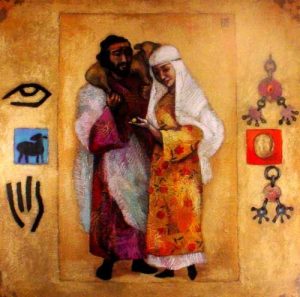
Lost Coin and Lost Sheep by Nelly Bube, an artist from Kazakhstan
Is this not how we would respond in a similar situation, asks Jesus, and wouldn’t we be so relieved on finding the thing we had lost that we would call our friends and neighbours to celebrate with us? These are the extraordinary actions of people who value each one of their possessions so highly that they prioritise restoring them to their rightful place over all else, and who would expect their community to rejoice along with them when they succeed. This, explains Jesus to the failed shepherds of the people of Israel, is what God is really like. In God’s kingdom, every individual matters. When even one person who has felt cut off from God realises that God loves them just the way they are, God throws a great party in heaven and invites us to rejoice with him.
When we hear on the news of eco systems being destroyed and of thousands of homes and lives being lost because of wild fires or flooding, it is easy to think ‘this is to big’ or ‘there’s nothing I can do to make a difference’ and to get on with our day. But if each individual person matters to God, they should matter to us too.

Last week Pam Martin shared with us the inspiring starfish story which reminds us that every individual is important and that every little thing that we do to help others counts. But like the person on the beach who throws the stranded starfish back into the water one at a time, and like the shepherd and the woman in Jesus’ stories, we need to make time to respond when we see a need. I wonder if each of us could take an hour this week to search for some information about a particular aspect of the Climate Crisis? It could be information about a particular habitat or community affected badly by climate change. We could find information about a project or a charity to support. We could find information about a way of using our voice to call for change. We could use the information we’ve found to help us to pray about a particular situation.
You are all welcome to bring the information you have found to church where, for the next few weeks, there will be a starfish-themed area for it to be displayed and shared.
In the meantime, here is a blessing for you to receive and to share:
Walk softly upon the earth. May its beauty surround you, may its wisdom delight you, its music invite you. May you love and be loved, may you know peace and practice compassion, rejoice in the earth and in all of creation. Amen.
At our 10.30 service today, Nerys will be joined by Pam Martin, a lay minister who works with young families at the parish church in Levens in South Cumbria and who has been involved for many years in organising environmental action with the charity A Rocha.
Pam writes: The situation we find ourselves in today is very serious indeed. The web of life of which we as human beings are an integral part is broken. By that I mean that because of the loss of biodiversity through habitat destruction, climate change, the use of chemicals in agriculture, pollution etc, a number of species of flora and fauna are now extinct, and the rate of extinctions is accelerating exponentially. In the UK, one of the most nature-depleted countries in the world, 15% of species face imminent extinction. Because of the interdependence of all parts of the web of life, even one becoming extinct can have the effect of weakening the species to which it was linked – and that may then lead to their extinction.

I find it helpful to have a visual symbol for this. In the image above you can see that one point of connection has broken and the threads that linked it to the surrounding 4 points of connection are hanging loose. In the natural world this might translate into the loss of a food source, for example, or some toxic influence. It seems incredible, but the loss of a small insect might have an impact on our lives, for example if we don’t take urgent action to save our bees, we shall have serious problems with food production, since they offer the critical service of pollination.
The two big issues we need to address in all aspects of our lives are climate change and biodiversity loss, both of which are getting worse year on year. As Christians, we are the people who profess a creator God. We are the people who were given the two great commandments, to love God and love our neighbour. If we love God we must love and protect what God loves and we know from the creation story in Genesis that God was very pleased with what he had created.
We also know that climate change, in particular, is affecting the poorest people in the world disproportionately and they are the very people who have contributed least to the truly dangerous situation in which we find ourselves. They are our neighbours. We need to show that we love them by living in a way that helps to reverse the damage to the natural world.
One of my favourite Christian poets – Gideon Heugh – puts it like this.
I stand outside the barred church doors
hammering with my fists
while around me the world dies.
I don’t want to be let in,
but pray for those inside
to come out and join the fight.
It is our Christian duty to stand up and be counted.
Our readings today were not written with the environment specifically in mind. The Old Testament passage, Deuteronomy 30.15-20, depicts the time when Moses was leading the children of Israel back from slavery in Egypt to the promised land. Psalm 1 speaks of the joy to be found in following God’s commandments. And the Gospel, Luke 14.25-35, indicates that being a disciple of Jesus is never easy. We are challenged to live counter-culturally as we follow the great commandment: Love God with all your heart and your neighbour as yourself.
They do, however, have something to say to us in our current environmental crisis, so let me pick out some verses from all three readings so that we can consider them in the context of creation care. Just take a moment of quiet to focus on the climate crisis and run-away extinction …
Today I am giving you the choice between good and evil. I am giving you the choice between life and death. Choose life!
Love the Lord your God, obey him and be faithful to him, then you and your descendants will live long in the land that he promised to give your ancestors. The command I am giving you is not difficult or beyond your reach.
Happy are those who find joy in obeying the law of the Lord. They are like trees that grow beside the stream, that bear fruit at the right time and whose leaves don’t dry up.
None of you can be my disciples unless you give up everything you have.
These verses sound just as if they had been written for our times don’t they!
Do you sometimes listen to the news and feel that things are so bad that there is nothing you can do to make a difference? If this is true of you, you’re certainly not alone. But we need to remember the words from Deuteronomy, ‘The command I’m giving you is not difficult or beyond your reach’ and Jesus’ words to his disciples, ‘I came to give you life in all its fullness.’ And we need to remember that lots of little actions can build into something huge. And the more people who take small steps the greater the effect. Here is a little story that exemplifies this.
An elderly man was walking along a beach early in the morning and saw a figure ahead of him who appeared to be dancing. As he drew nearer he saw that is was a young woman. She wasn’t dancing – but bending down to pick up starfish and throw them gently back into the sea. “Young woman, what are you doing?” “Well the sun is up and the tide is going out and unless I throw these star fish back into the ocean they will die.” “But do you not realise, there are miles and miles of beach – and star fish all along it. You can’t possibly make a difference.” The young woman listened politely to what he said. Then she bent down and picked up another starfish and very gently threw it back into the surf and watched as it escaped into deeper water. “Well it made a difference to that one.”

So how do we cope with what lies ahead? What do we need to do? And where do we start? Well first and foremost we need to pray and encourage others to pray. Then we need to chip away at the long list of small steps we can take that will eventually add up to making a significant contribution to the healing of God’s creation. We must hold our politicians to account and make it clear what we expect them to do.
And we must not allow the enormity of the task to overwhelm us. We must not keep looking back to our younger days when everything seemed much simpler. We must keep looking forward and we must step outside our comfort zones to stand up and be counted.
Once again Gideon Heugh has just the right words to challenge us and spur us into action.
The Prophet
I wonder why you brought me to these splintering days,
this age of earth-death and default extinction
and the smothering of constellations.
Nostalgia claws at me, screaming: send me back!
Then I sense a fire that doesn’t consume,
a cloud of breath-taking holiness
passing across the face of a mountain and it says
‘I put you here to see, to see and hear and feel the agony,
I needed someone whose heart would break,
who would fall to their knees screaming
Send me!’
May it be so for each of us from today. May we live our lives with renewed vigour, ready and willing to do what is necessary to protect and heal God’s creation, in Jesus’ name. Amen.

The name A Rocha is Portuguese for ‘The Rock’. This is because the charity started in Portugal where Rev’d Dave Bookless came across it when he was on holiday. He was very impressed with what he saw and brought the charity to the UK about 20 years ago.
A Rocha is a Christian environmental charity. Its aim is the protection, conservation and restoration of the natural world and the equipping of Christians to care for God’s creation. A Rocha works with churches through its Eco Church programme, with Church leaders through its interdenominational convening work, with individuals and families through the Wild Christian programme and with land managers through the Partners in Action Network.
For more information visit www.arocha.org.uk
Nerys writes: As many of you are aware, I’m just back from another visit to Wales. On my long journeys by train, there’s nothing I like better to pass the time that to watch the people around me and notice their behaviour. Jesus was a great people-watcher as we see from today’s Gospel passage, Luke 14.1, 7-14. Jesus had probably been invited to that Sabbath meal so that his actions and his thinking could be scrutinised by the religious leaders of that particular village. But as Luke’s narrative unfolds, the watchers become the watched and the occasion is used by Jesus for some many-layered teaching which is just as challenging to us today as it was over two thousand years ago.
As Jesus had been brought up in the same culture and tradition as his fellow-guests, they would naturally have expected him to think and reason in the same way as they did. But, even before the first course is served, Jesus deliberately provokes them by healing a sick man, having first challenged them to say whether this was permitted on the Sabbath or not. In response to their stony silence, Jesus turns the tables on them with the fruits of his people-watching. He had noticed how they had been jostling for the best positions at the table so he gives them what seems on the surface to be some practical advice, the kind of advice found in traditional Jewish wisdom, on how to avoid social embarrassment.
In Jesus’ day, the giving and receiving of invitations to formal meals was an important way of advancing or protecting your position in society. If the dining room was ordered according to the classic Roman style, as many of the fine houses in Galilee and Judea were at this time, there would have been a strict protocol about who sat where. The most honoured guest, chosen according to their wealth, power or office, would be invited to recline to the right of the host, the next to the left and so on down to the last place at the far end of the table. As it was the custom for the more important guests to arrive at the last minute, there would have been a very real chance of someone more worthy than you arriving after you. Then you would be asked to move down to an empty space at the other end of the table to sit among the least honourable of the guests.
Jesus’ advice to his companions at the table is to choose to take that lowest place and see what happens rather than hustle for the highest position and risk being shamed. He then turns to the host with another, even more radical proposition. Instead of inviting those who can repay you with a similar banquet, he suggests, welcome in those who can’t give you anything in return, those who would usually be excluded from your social circle.
We are not told how his host and fellow-guests responded to these words but they appear to have been calculated to cause as much embarrassment as possible. It is obvious, though, that what Jesus says isn’t just about etiquette but that he is speaking in parables. I wonder to what extent the religious people among whom he was sitting at the meal understood the much harsher criticism of them that lay behind this teaching on table manners?
Just as they scrambled to achieve a place of honour at the feast, these Scribes and Pharisees also sought to gain status before God through their own efforts, imagining that they were superior in God’s sight to those, like the poor man who’d just been healed, who weren’t able to learn or keep God’s law. The irony is that these men through their learning, would have been familiar with the idea of the great banquet at the end of time where God will invite people from all the nations of the world to dine with him. Down the centuries their teachers had reframed the Prophet Isaiah’s beautiful vision of salvation into a meal where only pious Jews who meticulously observed God’s law would be allowed to attend. As a result, they spent their lives seeking to secure for themselves a place of honour at that feast by maintaining their own religious purity and condemning those who were forced to live differently because of poverty or disability.
They would have expected Jesus who was from the same tradition as them, to agree with their reinterpretation of Isaiah’s dream. Imagine their reaction as Jesus presents to them through his words and actions a very different view of God’s kingdom which will include not only foreigners of all kinds but also the untouchables of their own communities! It is no wonder that they were watching him so closely.
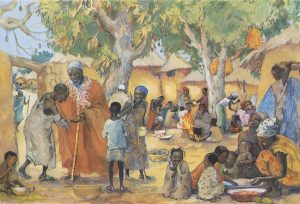
Some of Luke’s first readers would also have been challenged by this teaching of Jesus. In the Early Church, many Christians from a Jewish background found it difficult to welcome non-Jewish believers as equals before God. There were also wealthy Christians like those in Corinth who had to be reminded by Paul to put aside their social superiority when they came for communion because one day the tables will be turned. One day, the first will be last and the last will be first. This warning rings clear throughout the Gospels. From Mary’s words in the Magnificat to Jesus’ words to the penitent thief on the cross, there are repeated promises to those who are poor, downtrodden, excluded and exploited and threats to those who are powerful, rich and smugly religious.
Today’s passage from the Letter to the Hebrews 13.1-8, 15-16, spells out what life in a community of believers should be like. It is to be marked by mutual self-giving love which extends to the offering of a warm welcome and generous hospitality to all those who come to us in need. This was not an easy or even a natural thing to do for those early Christians. It certainly goes against the culture of the society we live in today. But as the author of the letter has reminded us, Jesus the Messiah is the same, yesterday, today and for ever. He is not just a memory, but a living presence in our life and he will support us as we are called to imitate him in his humility and his inclusivity.
As you pray today for eyes to see others as Jesus did, to recognise each person in need as God’s beloved child and to respond to them with generosity and love, you may wish to reflect on this joyful painting above of the poor being welcomed to the feast from the Jesus Mafa project.
Nerys writes: It is appropriate that on the first Sunday of the school year, our Old Testament reading is about a young boy who feels very inadequate and unprepared to respond to God’s call. As you read Jeremiah 1.4-10, I invite you to use your imagination to enter into the story.
What a challenge the young Jeremiah was given! To speak for God to his own people would be onerous enough but he was called to take the message to the people of the whole world. Can you imagine how he felt being asked to undertake such a huge task? It’s no wonder he objected. But God’s answer to Jeremiah is a reminder to us all that we’re never too young or too old to do God’s work. We might not feel that we’re ready, we might not feel that we’re clever enough or experienced enough, or good enough but we won’t be doing it alone. God’s promise to Jeremiah is a promise made to each one of us. God says, ‘I promise to be with you and keep you safe.’ There’s no need to be afraid or worried. We can speak for God wherever we are. God will give us the right words to say just as she did for Jeremiah. We can speak for God in our strength and in our weakness.
I invite you to use your imagination once more as you read today’s Gospel, Luke 13.10-17. Can you picture what life was like for the woman who shuffled into the synagogue to see Jesus?. She had been bent double for eighteen years, a good portion of her adult life. It is not difficult to imagine how it would have limited her enjoyment of life – no longer able to work or even to walk around freely, no longer able to easily see the stars by night or the clouds by day, no longer able to look into the eyes of her friends and neighbours and converse with them as she used to. People would have talked about her rather than with her, avoiding her, blaming her for her condition. Think how miserable her life would have been, struggling with hardship and loneliness on the margins of her community, trapped in a body that didn’t work, feeling cut off from everyone, even God.
It is obvious that everybody knew who she was and what was wrong with her but no one had reached out to her – not until Jesus came to town. Not until he noticed her among the crowd, called her to him and, without asking her a single question, realised what she needed and set her free. Can you imagine how she felt as she stood up straight and burst out into praise of God? The physical restriction that prevented her from living life to the full has gone, and so has the emotional and spiritual chains that had prevented her from worshiping. She is now free to respond with joy and thanksgiving.
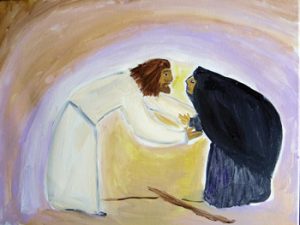
Jesus and the bent over woman by Barabara Schwartz
The reaction of the crowd is very different, however. Instead of going wild with astonishment and delight, they fall silent, all eyes on the leader of the synagogue. He must have been the one who had invited the popular new rabbi to teach there on that particular Sabbath, but now he is furious with him. Here was someone who thought that rules were more important than people, someone who wasn’t able to hear God’s spirit calling him to respond with kindness to this ‘daughter of Abraham’. His mind and spirit were just as trapped as the woman’s body had been. We aren’t told what became of him, but Jesus was to meet plenty more like him on his way to Jerusalem.
The crowd eventually join with the woman in celebration, realising perhaps that what they had witnessed there in the synagogue, was the presence of the God who loves all his children. Perhaps what they had seen had given them hope that they also could be set free to worship and serve Him without constantly worrying about religious rules and regulations.
I wonder what you make of this story?
I wonder if there is anyone you need to reach out to with kindness this week?
Remember that you’re not too young or too old and that God has promised to be with you and give you the words you need.
You may wish to pray: Loving God, give me the courage to respond to your call, trusting that in spite of my limitations your grace is all I need.
At the beginning of a new school year, pray especially for children who carry with them a burden of anxiety or grief, the children of refugees and asylum seekers, children of families living in poverty or dealing with physical or mental ill health.
Pray that our schools would be places of learning, creativity, encouragement and discovery for all our young people, asking that your peace and joy would fill classrooms and playgrounds.
Pray that staff rooms would be places where words of encouragement, support and hope are spoken and where friendships grow and that in challenging moments, you would give teachers and support staff patience, energy and a sense of your presence
Pray for headteachers and those who make decisions about education at local and government level, that they would lead with integrity and that they would be influencers for good.
Pray for school chaplains and those who lead Christian events that they would speak for God with wisdom and sensitivity.
Pray for wisdom for our yourself, asking that God would help you bring encouragement to the children in your own family and in St Mary’s both practically and through ongoing prayer.
Nerys writes: Our Gospel passage today, Luke 12.49-56, contains eight of the toughest verses in Luke’s Gospel. I wonder what you make of them? I find these words of Jesus unexpectedly harsh and also very puzzling. How could the one whose birth was announced with a promise of peace, who brought peace to troubled minds and hearts, who encouraged his disciples to offer words of peace to all they met, speak so stridently about bringing fire to the earth and division to families?
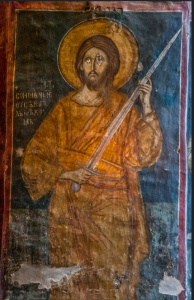
An unusual fresco of Jesus holding a sword from Decan Monastery in Kosovo.
Theologians down the centuries have not been able to agree about how to interpret this passage. Some have seen it as a justification of religious conflict or even as a warrant for war. When we read it in the light of the whole Gospel story, however, we see it as descriptive rather than prescriptive. It wasn’t Jesus’ purpose to set children against their parents but he knew that his coming to the world would bring about such divisions. In the words of Simeon at his dedication, he was the child ‘destined for the falling and rising of many in Israel’. He knew that the kingdom of peace he was inaugurating would only be established through confronting ‘the powers that be’ of his day and that if he was to persevere, he himself would be caught up in the crisis. As he spoke the stern words of our passage, he was on the road to Jerusalem, on a journey towards rejection, abuse and death at the hands of those who were ready to fight tooth and nail to protect the status quo.
Jesus knew that the consequence of his followers’ choice to imitate his trust in the Father would be tension and trauma within families, communities and nations. We see that this is nothing new when we read our New Testament passage, Hebrews 11.29-12.2. The author writes of the cloud of witnesses, the people of faith who came before us. Some are celebrated for achieving great victories but many, many more are remembered for the suffering which they endured as a consequence of their choice to live their lives by faith.
It is very tempting today as it was in Jesus’ day to ignore what’s going on in the wider world. Luke’s Jesus challenged the crowd to read the signs of the times by looking at current events, just as they would forecast the weather by looking at the sky. He challenged them to take a hard look at the oppression and corruption their people were enduring and to accept that Israel was at a crossroads. A crisis was coming and they needed to decide how they would react to it before it was too late.
Today, our role as the church, is to become aware of the unjust systems of our day and to expose them with the light of the Gospel message of love. We are called to imitate Christ by speaking out for justice, treating every human being as our sister and brother, showing mercy to all those in need.
We choose to do this knowing that it won’t be easy and that we will face hostility from within and without. As the author of the letter to the Hebrews has reminded us, the race that is set before us is not a sprint but a marathon. It requires endurance and perseverance. There are all kinds of obstacles and difficulties that hinder our progress. But we don’t run the race alone. Christ runs ahead of us, clearing the way, setting the pace. What we need to do is to follow him.

At the 10.30 a.m. service today, our own Roger Lockwood, chair of the Scottish Council of the RNLI will be speaking about the volunteer lifeboat crews in the Channel who for the last five years or so have been rescuing asylum seekers who attempt to get to the UK in dinghies or small boats. In your time of prayer today, I invite you to consider in the presence of Christ your response to the needs of all those who have been driven from their homes and communities by hardship or violence.
Loving God, make me aware of the signs that are all around me of an unjust world where many suffer needlessly because of war, greed and complacency.
Help me not to look away but through my prayers and my actions, may I respond with mercy and love.
Make us at St Mary’s a holy church, a healing church, a hospitable church.
We pray for our bishops following the Lambeth Conference.
We pray for our young people following the Provincial Youth Gathering.
We pray for all known to us who are struggling or in need.
Help us to raise to the challenges you lay before us however costly and uncomfortable,
God, whose purpose is to kindle,
now ignite us with your fire.
While the earth awaits your burning,
with your passion us inspire.
Overcome our sinful calmness,
stir us with your saving name.
Baptize with your fiery Spirit,
crown our lives with tongues of flame.
God, who still a sword delivers
rather than a placid peace,
with your sharpened word disturb us,
from complacency release!
Save us now from satisfaction,
when we privately are free,
yet are undisturbed in spirit
by our neighbour’s misery.
God, who in your holy gospel
wills that all should truly live,
make us sense our share of failure,
our tranquility forgive.
Teach us courage as we struggle
in all liberating strife.
Lift the smallness of our vision
by your own abundant life.
Elton Trueblood (can be sung to ‘Ode to Joy’)
Nerys writes: Today at St Mary’s we’re holding special Sea Sunday Services to celebrate and pray for seafarers all over the world. Did you know that 95% of all imports and exports to the UK are transported by sea? Many of those who work on ships have a hard life, away from their families for months at a time and the Covid pandemic continues to make this even more difficult for them. So it’s important that we continue to pray for them and for those Christian organisations who are seeking to support them.
Our readings today, Psalm 107.23-30 and Luke 8.22-25 have been especially chosen to help us to pray for seafarers around the world and the many storms that beset them. This winter here in Dunblane, we were battered by high winds and it was pretty scary at times. Can you imagine being on a ship at sea in storms like that? Typhoons and large Atlantic storms can shipwreck even the largest container vessel. Those disciples of Jesus who fished would have been well aware of the power of the storms that whipped up the sea of Galilee and how a small wooden fishing boat could easily be submerged.
In Hebrew culture, large bodies of water were the home of Leviathan, the embodiment of chaos. Only God could control the sea and the evil within it. And so, by calming the storm, by controlling the evil within it, Jesus proved his divinity. And, it wouldn’t have gone unnoticed amongst his Jewish followers that this act mirrored exactly the words of Psalm 107: ‘Then they cried out to the Lord in their trouble, and He brought them out of their distress. He calmed the storm to a whisper, and the waves of the sea were hushed.’
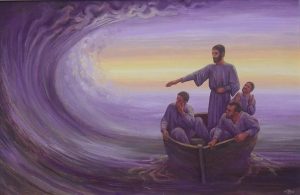
‘Calming of the Storm’ by Peter Koenig
When Jesus calms the storm, we are encouraged to have faith that He will be with us in the middle of all the storms of our lives. Recently there seems to have been a lot of those between Covid with its isolation and the fear and loss it brought with it, the war in Ukraine and the helplessness we feel, rising prices adding financial worries into the mix, and the extreme heat reminding us that Climate Change is real. But if we are struggling, imagine what it must be like for a seafarer who can be at sea for months. During the pandemic, some were on their ships for seventeen months or more. Many come from the poorest areas of the world. They work long hours for low wages, separated from those they love. At sea often they can’t get a signal or Wi-Fi, so they can’t Facetime, or even text family and friends. And their lockdown is still going on, as often they are still not allowed to leave their ship when it is in port. So, as well as facing real storms, they face the storms of isolation, loneliness, depression, anxiety over finances and, more recently with Ukraine, the safety of family members. Imagine being a Ukrainian seafarer unable to speak to your family caught up in the war?
But just as Jesus responded to his disciples when they were caught in the storm, God listens and responds to our prayers today. Not only has God promised to be with us during the difficult times in our lives but God also will answer our prayers, often through the work of others who have heard God’s call. And for those working at sea, those prayers are often answered by the work of organisations like the Mission to Seafarers. In two hundred ports around the world, Mission to Seafarers chaplains and volunteers visit ships, run welcome centres and provide transport and other support services, sharing the love of Christ with individuals in their anxiety, loneliness and depression.
In your time of prayer today, I invite you to pray for all those caught up in the storms of life and especially for the thousands of seafarers and their families, and to give thanks for the work of organisations who serve them.
O God our defender, storms rage about us and cause us to be afraid. Rescue your people from despair, deliver your sons and daughters from fear, and preserve us all from unbelief; through your Son, Jesus Christ our Lord, who lives and reigns with you and the Holy Spirit, one God, now and for ever. Amen

If you wish to give a donation to The Mission to Seafarers, you can send a cheque to Mission to Seafarers Scotland,
109 Avalon Gardens, Linlithgow Bridge, Linlithgow
EH49 7PL
or visit www.missiontoseafarers.org
Moira writes: This Sunday if you have time, it is worth reading all four Bible passages set for today. Each of them is teaching us what we need to do to be ready for the day of judgement and to prepare us for coming face to face with our maker.
In the passage from Ecclesiastes 1, vs 1, 12-14 and 2, vs 18-23) we are shown that the things of this world are nothing but “vanity and a chasing after the wind.” We are constantly seeking wisdom in all areas of life and often when we find it, we must leave it behind for those who come after us. An example of this is the great scholars who have written books on medical science, research and great religious studies to name but a few. All their wisdom they left behind for the benefit of others, which leads me to ask, how can this be vanity? What this passage is trying to teach us, I think, is that things achieved for the good of others and not for ourselves is the kind of “treasure” we should be storing up.
In the Psalm 49, vs 1-12 the writer once again speaks of wisdom and warns that wisdom which is not shared, but used for promoting ourselves in the world, makes us foolish. Then in Paul’s letter to the Colossians 3, vs 1-11 we receive more teaching on how we should be living our lives, to prepare us for the day of judgement. Paul gives a list of things that we must rid ourselves of if we want to live the Christian life, we must get rid of “anger, wrath, malice, slander, and abusive language from our mouths….”
Moving on to Luke’s gospel passage (Luke 12, vs 13-21), we hear warnings about greed and again about storing up the things of this world – storing up possessions which we can’t take with us when we die. In this passage we are told that Jesus was approached by “someone” in the crowd who was looking for judgement on a family matter. In Jesus’ day, these types of disputes were usually decided by a “bench of three” from the local synagogues. But as is his way, Jesus once again refuses to be drawn into any political or semi-political action. Jesus told this person, “Friend, who set me to be a judge or arbitrator over you?” Then he turned to the crowd and gave them a warning. He said, “Take care. Be on your guard against all kinds of greed, for one’s life does not consist in the abundance of possessions.” In the case of this family, Jewish law clearly prescribed that at the death of the father, the elder son would receive two thirds of the inheritance, and the younger son would receive one third. From reading our story this morning, it looks like it was the younger son who was complaining about the inherent unfairness of it all. I’m sure we all know that the one thing that can cause division between brothers and sisters is the dividing up of an estate, and so Jesus, quite rightly, refuses to get involved in a petty family squabble.
Jesus was concerned however with the larger implications of the brothers’ preoccupation with the things of this world and warns them that the total of a person’s life is more than how much wealth they have amassed. Jesus then illustrated his point by telling a story. There was once a man who had an unbroken run of prosperity. (In today’s language, he had successfully played the stock market or dabbled in the property market.) So prosperous was he that his barns could not hold all his crops. His solution was to tear down these barns and build bigger and better ones. The, with his financial security in hand, he could sit back and truly enjoy life, at least that was what he thought. His philosophy was, eat, drink and be merry. Truth be told, when we hear this story, I expect we may find ourselves envious of this man. A financially successful man who looks to us as being confident and wise. Yet, Jesus concluded the story by saying that this man was a fool. Instead of living a full and rich life, being happy and content, in love and charity with his neighbour and reaching out to those in need, this man was more concerned with how much money, land and crops he could store up for himself. And that’s the key word here, “himself,” not how much he could store up to help others. The good news that comes from our gospel passage is that there is a measure of grace in the way that Jesus brings this hard message to all who hear it. Jesus’ warning to the people of his time was a mark of his love for them as well as for us.
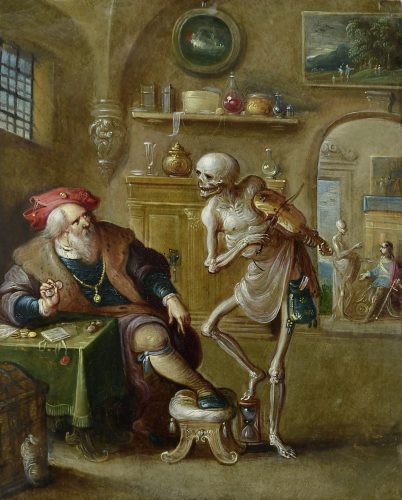 He wants us to know how to store up the kind of treasure we need for the day of judgement. The whole of life is an opportunity to draw closer to God and to grow in the kind of life that he wants for us. If we miss that opportunity by allowing ourselves to be possessed by possessions, by committing ourselves to the things of this world, then we will have missed the point of life and we will stand empty handed before God, when our time comes, with no excuses. He wants us to know how to store up the kind of treasure we need for the day of judgement. The whole of life is an opportunity to draw closer to God and to grow in the kind of life that he wants for us. If we miss that opportunity by allowing ourselves to be possessed by possessions, by committing ourselves to the things of this world, then we will have missed the point of life and we will stand empty handed before God, when our time comes, with no excuses.
Death and the Rich Man. Frans II Francken (1581 – 1642)
Jesus wants us to live for God and for our fellow human beings, helped by the power of his loving spirit alive within us. This leads me to the question, “what does this mean for us today?” Sometime during this week, you may wish to ponder over this question and ask ourselves, “What would fulfil me more, free me more, establish me more as a person? Acquiring more things, or sharing more of myself with others?”
The love of Jesus seeks to empower us and to free us, he gives us choices and it’s up to us to try to make the right ones. What would it be like to never realise that we have choices, or not to understand that pure grace from God leads us to know what kinds of choices make us truly rich? This is a big challenge again this week, but it is one we have the ability to live up to.
“So, it is with those who store up treasure for themselves but are not rich towards God.” Amen.
As you sit by your lighted candle, you might like to pray:
For wisdom to make the right choices as we grow in our journey of faith.
For a servant heart as we seek to help others.
For those who are struggling to feed their families in today’s world where some have plenty and others have nothing.
For peace in our world and for justice and equity to prevail.
Finally, please pray for those attending the Lambeth Conference and especially for the Bishops in the Scottish Episcopal Church.
|
|







 Think about the food in your own house. Can you see your cupboards, your fridge, or your freezer from where you’re sitting? Open them in your mind’s eye to see the food within. Can you see your secret stash of chocolate biscuits on the top shelf that no-one else can reach?!
Think about the food in your own house. Can you see your cupboards, your fridge, or your freezer from where you’re sitting? Open them in your mind’s eye to see the food within. Can you see your secret stash of chocolate biscuits on the top shelf that no-one else can reach?!
 Every table and every meal can be a reminder of that meal. Because from the altar we are sent back to the tables in our homes and invited to share there the same loving fellowship with neighbours and friends, with those who are lonely, lost, or lacking. We’re sent to bring a little of heaven to earth, to share abroad God’s love, with whatever energy, time, and means, that we have.
Every table and every meal can be a reminder of that meal. Because from the altar we are sent back to the tables in our homes and invited to share there the same loving fellowship with neighbours and friends, with those who are lonely, lost, or lacking. We’re sent to bring a little of heaven to earth, to share abroad God’s love, with whatever energy, time, and means, that we have.















 He wants us to know how to store up the kind of treasure we need for the day of judgement. The whole of life is an opportunity to draw closer to God and to grow in the kind of life that he wants for us. If we miss that opportunity by allowing ourselves to be possessed by possessions, by committing ourselves to the things of this world, then we will have missed the point of life and we will stand empty handed before God, when our time comes, with no excuses.
He wants us to know how to store up the kind of treasure we need for the day of judgement. The whole of life is an opportunity to draw closer to God and to grow in the kind of life that he wants for us. If we miss that opportunity by allowing ourselves to be possessed by possessions, by committing ourselves to the things of this world, then we will have missed the point of life and we will stand empty handed before God, when our time comes, with no excuses.